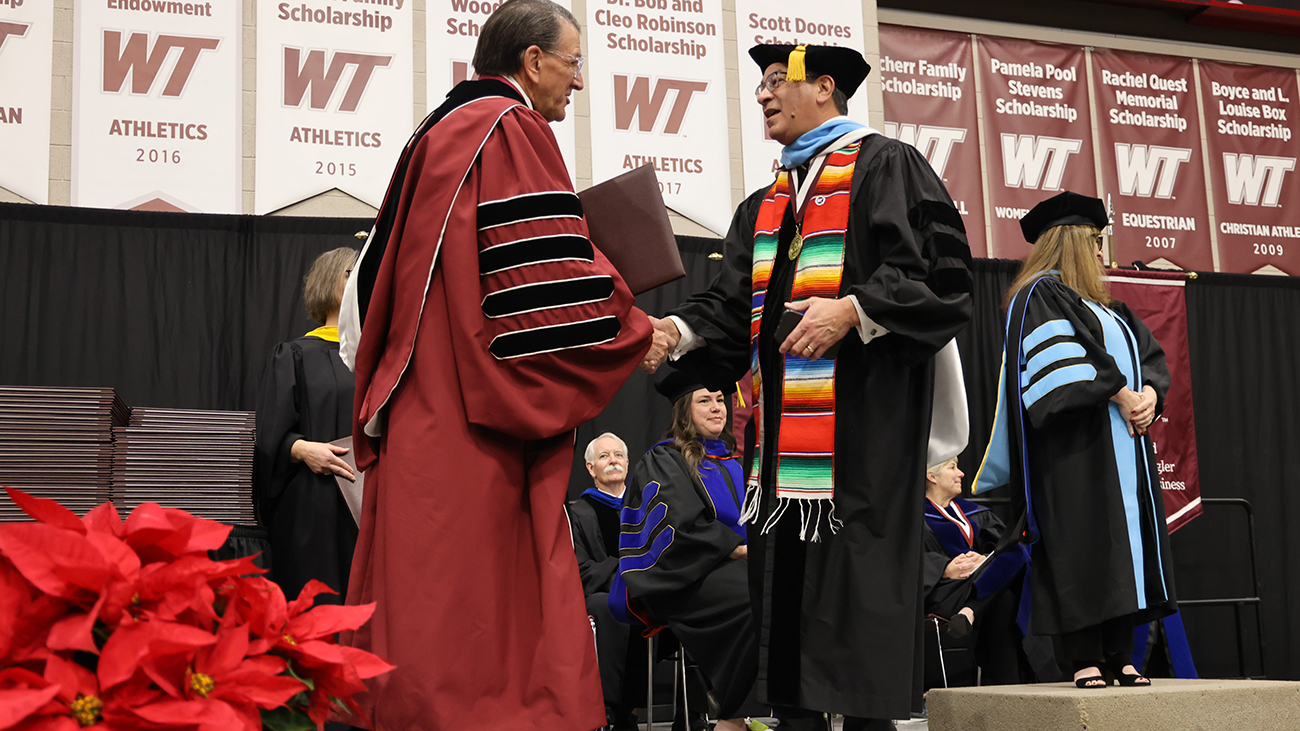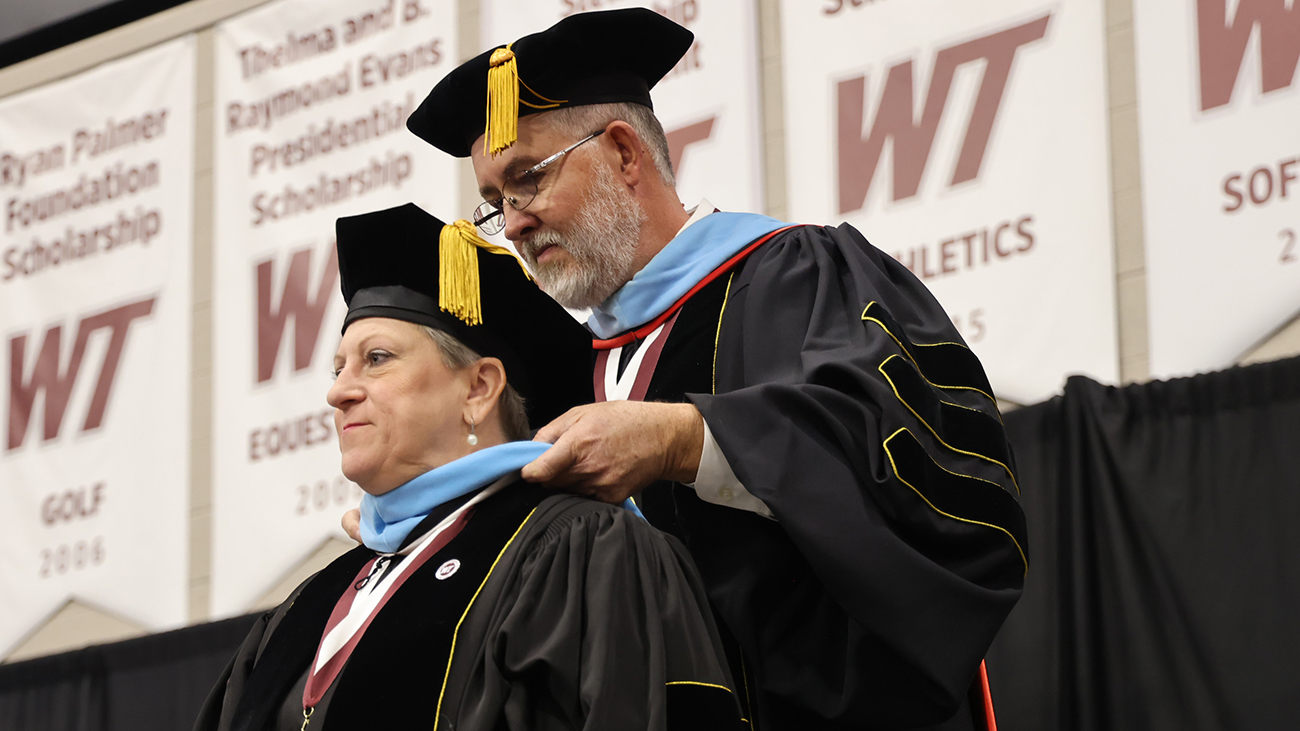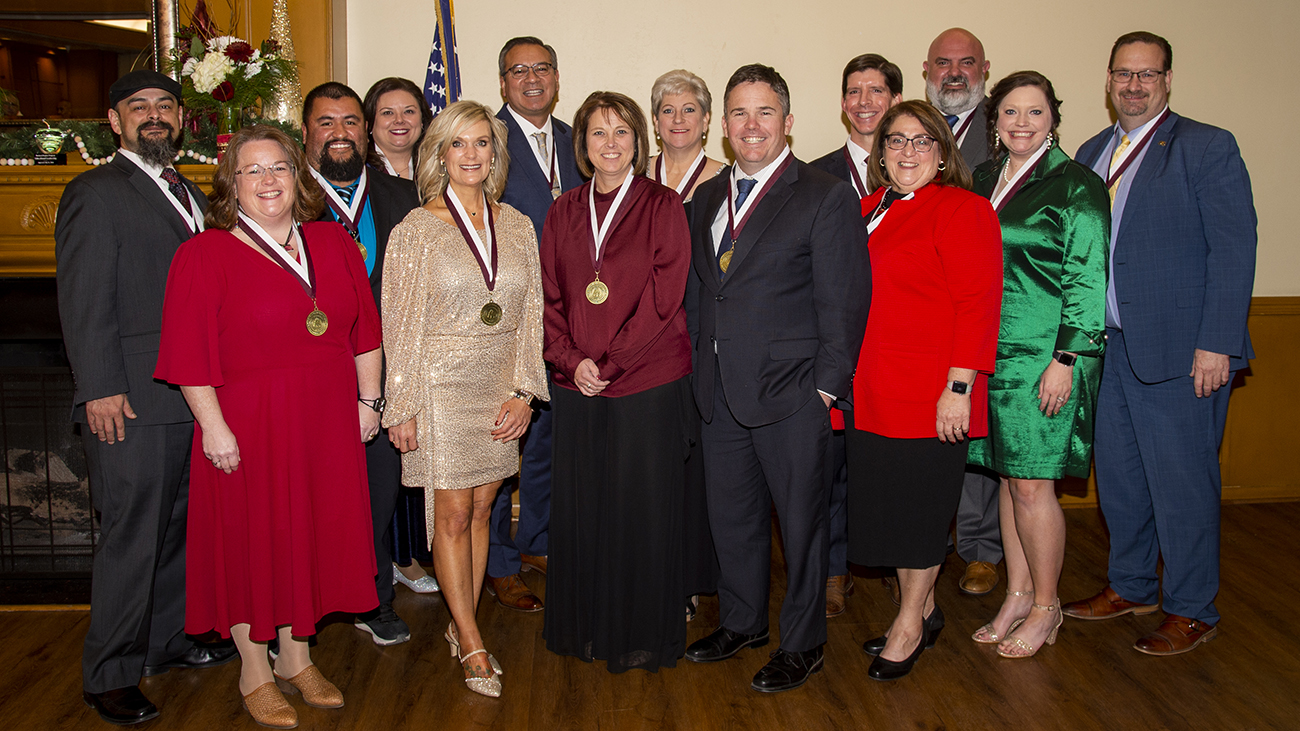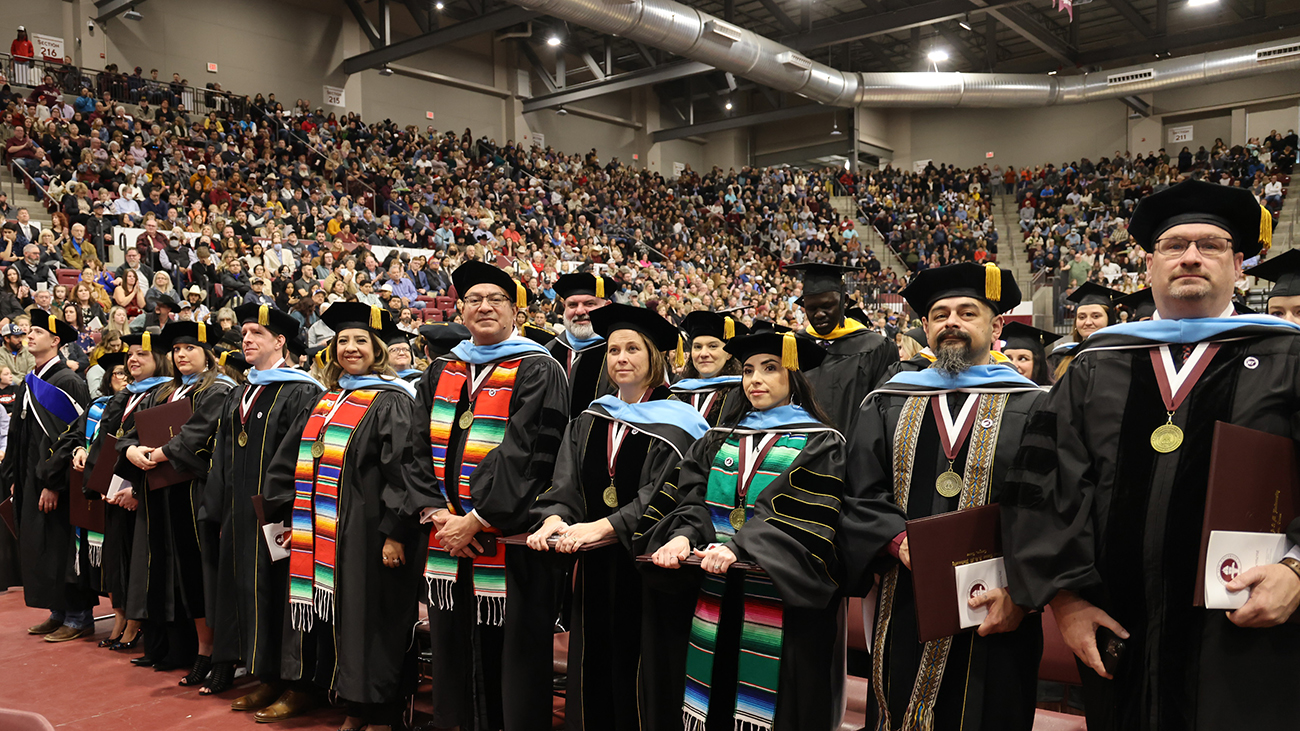- Community
- Jon Mark Beilue
- Research
- Graduate
- One West
- Featured
- Education
Jon Mark Beilue: Advancing rural education
Doctorate in educational leadership follows mission of WT 125 plan
For 18 school and college administrators, it was a compressed and intense 60 online hours over three years. That in itself was plenty, but then add their full-time jobs to the completion of a doctorate in educational leadership, and the challenge was – what, exactly?
“Oh, my goodness, keeping up with the pace of the program was very time-consuming,” said Dr. Misty Heiskell, intermediate school principal in Dalhart. “It took a true time commitment.”

Photo: West Texas A&M University President Walter V. Wendler, left, congratulates Dr. Mike Dominguez, superintendent at Stratford Independent School District, for earning one of WT’s first doctoral degrees in educational leadership during Dec. 11 commencement ceremonies in WT’s First United Bank Center.
Dr. Mike Dominguez, superintendent of Stratford Independent School District, is an early riser anyway, but he found himself getting up not so much early in the morning, but sometimes in the middle of the night to get his work completed.
“The rigor was absolutely there,” Dominguez said. “The reading and writing – it was purposely really hard. And it should be.”
Heiskell and Dominguez are two of the 18 educators who made a little history — for themselves and for West Texas A&M University. In commencement exercises on Dec. 11 , they were the first to receive doctorates in educational leadership from WT. It is the second doctorate offered by the university.
“The doctoral program provides faculty and students opportunities to engage in research of practice in rural schools and communities,” said Dr. Eddie Henderson, dean of the College of Education and Social Sciences, “and those opportunities in research certainly expands the expertise of the faculty and provides direct benefit to the region.”
The doctorate program is a reflection of WT 125: From the Panhandle to the World , the ambitious long-range plan launched in 2019. It calls for establishing WT as a regional research university focused on improving those issues that most affect first the Texas Panhandle, and then, if successful, beyond the Panhandle’s 26 counties.
There are five major areas WT 125 seeks to impact – water scarcity, wind engineering, rural healthcare, better managing smaller school districts and expanding the doctoral programs. The doctorate in educational leadership impacts two of the five.
There are approximately 1,240 school districts in Texas, according to the Texas Education Agency, and 665, or 53 percent, have less than 1,000 students. Rural education is the learning backbone of the Texas Panhandle.
“Education policy is primarily driven by urban education challenges and opportunities,” Henderson said. “Therefore, it was important that this doctoral program recognize the unique opportunities presented to rural schools and rural communities and seek to address those through high quality education leaders.
“This is not unique to Texas or the Texas Panhandle. Rural schools across the country are attempting to prepare education leaders with interdisciplinary skill sets where resources may be limited.”

Photo:Dr. Gary Bigham, director of West Texas A&M University’s doctorate in educational leadership program, places a doctoral hood over the shoulders of Dr. Misty Heiskell, who earned one of WT’s first doctoral degrees in educational leadership, during Dec. 11 commencement ceremonies in WT’s First United Bank Center.
In addition to Amarillo, the inaugural cohort class also represents eight rural West Texas school districts and Guymon in the Oklahoma Panhandle. Four work in higher education at regional colleges, with one outlier – Zeina Spaulding, executive director for professional development for the Duval County Public Schools in Jacksonville, Fla.
Dominguez has spent most of his 33 years in smaller school districts. While he has worked in Coppell and was deputy superintendent in Lewisville, both in the Dallas-Fort Worth metroplex, his education experiences have also been in Dumas, Vernon, Sanford-Fritch, and for the last five years, superintendent in Stratford, a school district of 585 students.
“Rural education is unique because we do have to provide the same services as Austin ISD, Houston ISD, Dallas ISD,” Dominguez said, “and they have so many layers to provide that. In a rural area, I get to wear 20 to 40 hats a day, and so do many others.”
Heiskell, a Canyon native, has split time in large and rural districts. She started at Dalhart as a third-grade teacher for five years. Then she spent time in the Amarillo and Canyon school districts before returning to Dalhart where she has been the intermediate (third through fifth grade) school principal for the last eight years.
“In the city, there is more opportunity for staff and professional development, which has a more positive impact on student learning,” she said. “There are easier opportunities to get trained. In rural settings, there’s not the funding and we don’t have easy access to those things.”
Dr. Gary Bigham is the director of the Ed.D. program, which requires 60 hours fully online that focus on identifying educational problems and developing solutions. Many of those issues to tackle fell in a variety of cultural, economic and emergency management areas.

Photo:Members of the first cohort of West Texas A&M University’s doctorate in educational leadership program celebrated their accomplishments at a Dec. 10 reception at Amarillo Country Club. Cohort members included, front from left, Jennifer Denham, Tiffany Longoria, Kelley Porter, Byron May, Teresa Mora and Bethany Davis; and back from left, Eric Sosa, Felix Isaac Martinez, Amy Clifton, Mike Dominguez, Misty Heiskell, Matthew Driver, Justin Richardson and Jerry Findley. Not pictured are Linda Castaneda Arañda, Gabriela Rivera, James Glovach, Angelica Okamoto, Liz Rascón-Alaniz and Zeina Spaulding.
The WT doctoral students specifically addressed academic success amidst poverty, ethical decisions in student-athlete discipline, leadership practices to engage Latino parents, and trust factors between principals and teachers. Instead of a dissertation, research resulted in two extensive articles for publication.
“Until you research a problem and find out the how and why behind it, it’s hard to come up with solutions that are impactful,” said Heiskell, whose daughter, Brianna Stegall, graduated the same day with a bachelor’s degree in strategic communication.
“We learned to do action research when you are in the problem. That’s the biggest piece missing in rural schools. Environment affects the decisions we make. It opened our eyes on how environment impacts the decisions we make when it comes to education. But the things we learned can roll over to larger districts in the city as well.”
Dominguez said he’s had a number of firsts in his career. He started two wrestling programs at Dumas and Hereford in the 1990s. As a Hispanic, he’s broken cultural barriers in his education trek especially coming from poverty in Altus, Okla.
“I always say this, ‘The first one through the door gets the bloody nose,’” Dominguez said. “I did want to be in the first cohort. How can I expect my principals to learn and grow if I’m not learning and growing? The same for teachers.
“No. 1, I’m a lifelong learner. No. 2, we’re not born winners and losers – we’re born choosers. I chose to take this on. It was difficult. It was hard. There was a lot to it, but it was worth it if I’m going to be a stakeholder in my school and community.”
Among the first doctoral graduates, Dominguez is proud to be among his fellow cohort, but enthused for those who will follow them.
“I’m really excited for the next groups,” he said. “We had a great experience, but there will be reflection. How can we get better? How can we improve? I’m excited for the next three, four and five cohorts. But for us being the first, it was great. It was spectacular.”
Do you know of a student, faculty member, project, an alumnus or any other story idea for “WT: The Heart and Soul of the Texas Panhandle?” If so, email Jon Mark Beilue at jbeilue@wtamu.edu .
West Texas A&M University’s first class of doctoral graduates in educational leadership:
- Gabriela Arriazola-Rivera, Amarillo Independent School District assistant principal;
- Linda Castaneda Aranda, Amarillo Independent School District educational diagnostician;
- Amy Clifton, WT College of Education and Social Sciences data specialist;
- Bethany Davis, Pampa Independent School District assistant principal;
- Mike Dominguez, Stratford Independent School District superintendent;
- Matthew K. Driver, Canyon Independent School District teacher;
- Jerry S. Findley, South Plains College dean of health sciences;
- Misty Heiskell, Dalhart Independent School District principal;
- Tiffany Longoria, Denver City Independent School District assistant principal;
- Felix Isaac Martinez, Levelland Independent School District middle school teacher and coach;
- Byron May, Pampa Independent School District principal;
- Teresa Mora, former director of Hispanic Student Services and Upward Bound at Oklahoma Panhandle State University;
- Angelica Garcia Okamoto, Dimmitt Independent School District director of student services;
- Kelley Porter, Lefors Independent School District superintendent;
- Liz Marie Rascón-Alaniz, Wesley Community Center executive director;
- Justin Richardson, chief learning officer of lead4ward in Canyon;
- Eric Sosa, WT Business Office post-award manager of sponsored research; and
- Zeina Spaulding, executive director of professional development for the Duval County Public Schools in Jacksonville, Fla.

